Abstract:In order to jointly produce indigenous raw materials for Nigeria's chemical and pharmaceutical industries, the Manufacturing Association of Nigeria (MAN) and the Raw Materials Research and Development Council (RMRDC) have started talks.

In order to jointly produce indigenous raw materials for Nigeria's chemical and pharmaceutical industries, the Manufacturing Association of Nigeria (MAN) and the Raw Materials Research and Development Council (RMRDC) have started talks.
Segun Ajayi-Kadir, MAN's Director-General, made this statement on Tuesday in Lagos during a Sectoral Dialogue Session sponsored by MAN's Chemical and Pharmaceutical Sectoral Group.
The Future of Chemical and Pharmaceutical Industry in Nigeria: The Role of RMRDC, according to the News Agency of Nigeria, is the topic of the debate.
According to Ajayi-Kadir, the partnership will assist firms in enhancing their raw material sourcing based on data and research findings.
He commended RMRDC for its significant commitment in maintaining the viability of Nigerian industry through persistent, ongoing research.
According to the director-general, the RMRDC study is aimed at localizing some necessary components for the sustainability of regional industry.
The issue of this discussion is pertinent and topical, given the government's efforts to promote backward integration.
We refer to it as resource-based industrialization in MAN, he remarked.
In his speech, RMRDC Director-General Prof. Ibrahim Doko urged investors in the manufacturing industry to work with the council to deliver cost-effective raw materials.
Dr. Mohammed Buga, Executive Director of RMRDC's Mineral Materials Development Department, speaking on behalf of Doko, said that the organization's enormous progress has shown its commitment to fulfilling its goal to source raw materials locally for national industrialization.
He stated that the concerns of the global supply chain disruption brought on by COVID-19, War, and the industry's competitiveness prompted the dialogue with the chemical and pharmaceutical industries.
Other issues that prompted the debate were highlighted by the director general, including Presidential Executive Order 5's requirement that businesses source their content locally, the lack of foreign currency, and the importance of raw material provenance for the Africa Continental Free Trade Area (AfCFTA).
There will never be a more compelling opportunity to acquire local content than right now.
With local raw material development, imports will decline, there will be less pressure on the foreign exchange market, manufacturers' profit margins will rise, more jobs will be created, and the economy's overall health will improve.
“We expect that manufacturing sector investors will work with the council to use the established methods for sustainable supply of competitive raw materials for the sector,” he said.
He claims that in an effort to boost industries' competitiveness, RMRDC created the National plan for competitiveness in Nigerian raw material and product development.
He said the approach was intended to gradually reduce the amount of imported raw materials and goods that the nation could create in the short, medium, and long terms.
The commercialization of the raw materials and bridging the gap between research, results, and the market, he said, will be facilitated by a committee made up of MAN, RMRDC, and other stakeholders.
The committee, according to the director-general, will deal with matters related to commercialization, such as financing, legal and regulatory concerns, and manufacturer incentives.
Mr. Rotimi Aluko, the chairman of the MAN's Chemical and Pharmaceutical Sectoral Group, praised RMRDC's commitment to national development by making research findings and other information about local raw material sourcing available to the public.
According to Aluko, the collaboration between the association and the council was intended to bring the council's research findings to the attention of manufacturers, particularly those in the chemical and pharmaceutical industries, in order to help manufacturers, expand their commercial operations.
We are aware that finding foreign exchange to import raw materials has recently turned into a nightmare for firms
As a result, he explained, it was essential to take into account local raw material sourcing through backward integration.
He said that if specific conditions, the appropriate individuals, and an enabling atmosphere were there, things would work in the manufacturers' favor and their company operations would improve.
Aluko pointed out that because of their burdensome costs, Nigerian manufacturers might not be able to compete with their counterparts under the AFCTA.
The establishment of an export processing zone along the border by the Republic of Benin is a blatant indication of their plan to use the benefits of the trade agreement to heavily saturate the Nigerian market with their goods.
It's frightening, but if we can get local material support, ideally at a lower cost, and if energy costs, other expenses, and various taxes don't offset the effect, then factories can prosper, he said.
According to NAN, attendees at the conversation session urged that the RMRDC make sure that raw materials are easily accessible at a reasonable price to support manufacturers' continued operations.










